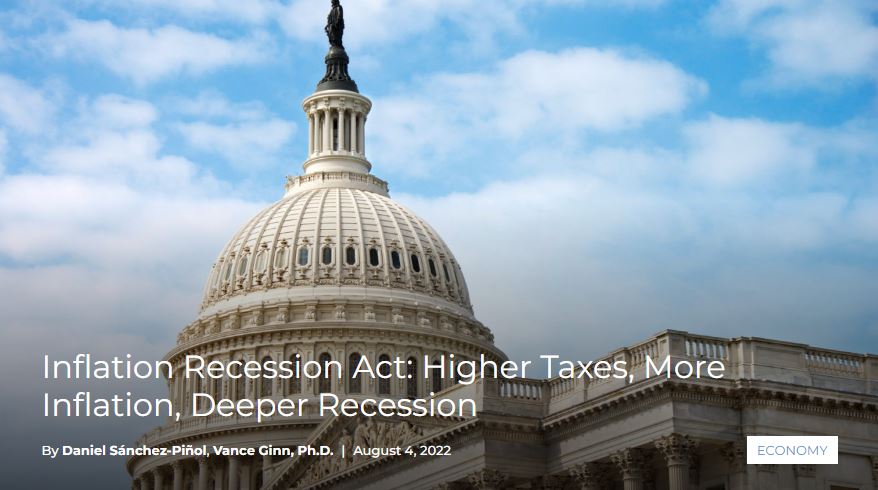|
While a stagnating economy with high inflation is what economists usually call stagflation, the current situation is worse, as the real economy is declining. So there’s much less to go around for everyone—making us poorer in the process.
This inflation-recession could be resolved by Washington reversing course, but President Joe Biden and Democrats in Congress are doing the opposite. Their new bill, called the “Inflation Reduction Act” (IRA), will spend more, raise taxes, increase debt, and contribute to more inflation, resulting in a deeper recession. The IRA includes estimated hikes in taxes with a new 15% corporate minimum tax rate, 87,000 new Internal Revenue Service (IRS) agents to audit more taxpayers, and new closure of “carried interest loophole.” These are each bad policies, but especially during a recession. These add up to an estimated tax hike of about $730 billion compared with current policy over the next 10 years. The main tax hike is the new alternative minimum tax (AMT) of 15% on book income for corporations with net income exceeding $1 billion. This proposal has a rosy revenue projection of $313 billion. But businesses don’t pay taxes; they just submit them. People pay them, through higher costs, lower wages, and fewer jobs. The dynamic effects will result in less tax revenue collected from this hike. According to a recent study by the Tax Foundation, this tax hike alone would contribute to killing 23,000 jobs, a 0.1% cut in wages, and 0.1% less in economic output. If we consider other provisions like the tax hikes on carried interest and reinstatement of the federal Superfund program, the total number of jobs killed is 30,000 with every income group having a reduction in after-tax income. Clearly, this wouldn’t reduce inflation or help the economy recover. But there’s more. While the IRA is aimed at taxing the rich and corporations more, the Congressional Joint Committee on Taxation finds that every income group except those with income between $10,000 to $20,000 per year would face a higher average tax rate. This would mean President Biden’s pledge to not tax anyone earning less than $400,000 per year would be broken, with about half of the burden falling on those earning less than $200,000 per year. And the $80 billion in additional funding for 87,000 new IRS agents to increase tax enforcement and compliance is expected to bring in a phony amount of about $200 billion over a decade. But this will just increase more bureaucracy in an already overly bureaucratic federal government that will make Americans’ lives worse as they put more costs on taxpayers. Specifically, there could be 1.2 million more individual audits per year, and you can bet when the IRS doesn’t increase tax collections from legal tax returns they will come after every tax group, not just those making more than $400,000 per year. On the spending side, the IRA provides tax incentives and subsidies for unreliable wind and solar energy, an expansion of Obamacare subsidies until 2025, and other expenditures to the tune of about $430 billion. Using these rosy assumptions, there is a projected deficit reduction of $300 billion over 10 years. However, more conservative estimates suggest that the IRA will have less deficit reduction and will likely increase the deficit. The Tax Foundation, Penn Wharton Budget Model (PWBM), and Congressional Budget Office (CBO) calculate a $178 billion, $247.8 billion, and $101.5 billion in deficit reduction over the next decade, respectively. But assuming the Obamacare subsidies are extended over the full 10-year period for an apples-to-apples comparison, the PWBM estimates that would bring that deficit reduction down by $158.9 billion to just $88.9 billion over the decade, which is the same amount of the deficit in just June 2022. But recall that these estimates are compared with current policy assumptions over the next decade, which already have massive deficits because of reckless spending, so the IRA will most likely make the deficit worse. Spending will be permanent and is on the front end of the bill, while taxes will likely be temporary and are more on the back end—so the deficit will be higher in the first few years, which will give the Federal Reserve more debt to purchase thereby creating more inflation. And the higher taxes, more debt, and more inflation will stifle economic growth so a deeper recession will result. The IRA does the opposite of what the name implies. This is now too common with Democrats in Congress as they like to keep redefining things that don’t match their narrative. They should instead name this bill the “Inflation Recession Act” because we will get more of both. This far-left agenda must be rejected. Kill the bill. Published at TPPF with Daniel Sanchez-Pinol Comments are closed.
|
Vance Ginn, Ph.D.
|


 RSS Feed
RSS Feed